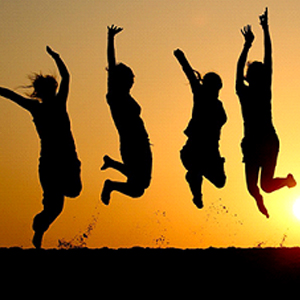
Fun in the sun is always just that –fun! The month of August marks Ultraviolet (UV) Safety Month, which promotes skin protection from the sun’s harmful UV rays so that you can have fun while being safe, too.
According to the American Cancer Society (ACS), there are many factors that can affect the strength of UV rays. For instance, UV rays are noted to be the most harmful between 10am to 4pm. They are also stronger during spring and summer months and depending on your location from the equator and your location’s altitude. UV rays can even cause damage on a cloudy day. In addition, they can reflect off windows, water, sand, snow, and pavement, for example, which can increase your UV exposure. UV exposure can also be influenced by the length of time you are exposed, as well as the amount of skin exposed without clothing or sunscreen. The ACS also states that certain individuals may be more at risk for developing skin cancer, such as those who suffered from frequent sunburns during childhood and those who have a family history of skin cancer.
One of the greatest methods to determine how strong the UV light is at a specific time and location is to check the UV Index brought to you by the US National Weather Service and the Environmental Protection Agency (EPA) at www.epa.gov/sunsafety/uv-index-1. The scale is represented from 1 to 11+, with the higher numbers indicating a greater risk of UV ray exposure.
Taking necessary safety precautions can help reduce your risk of skin cancer. Excessive exposure to UV rays through the sun, indoor tanning beds, sun lamps, and other man-made appliances can cause significant harm to the body. Tanning beds have been associated with an increased risk of melanoma, according to the ACS. Small UV lamps such as those used in nail salons have also been reported to give off UV rays that can increase your risk of skin cancer.
Staying in the shade, having on protective gear like sunglasses, hats, and shirts, and applying/re-applying sunscreen is crucial for your protection. Protection from the sun is even necessary your lips. Leaving your lips unprotected can significantly increase your risk of developing oral cancer. Look for a lip balm with sun protection factor (SPF) with broad spectrum coverage to protect your lips from both UVA and UVB rays, the most common types of UV rays that impact the skin. The ACS recommends using (SPF) values of 30 or higher for efficacy. However, it is important to note that no sunscreen will offer complete protection.
As children tend to spend a great deal of time outdoors, especially during the summer months, make sure they are protected. If you have a little one younger than 6 months, the ACS recommends that they should be kept out of direct sunlight and be covered in adequate clothing. Even if you plan on being outdoors for a brief period of time, prevention is key and these simple steps mentioned can be taken to help lower your risk of damage from UV ray exposure.
This pandemic has impacted us all, but our community is indeed all stronger together. Our team at WDG always has your safety and health as our top priority, and we have implemented additional safety measures and equipment to help prevent the transmission of all infections, including COVID-19. Wellesley Dental Group has completely reopened since June 8th, 2020 for all dental procedures and cleanings! Thank you for entrusting your health and dental care to us at Wellesley Dental Group.
Feel free to contact Drs. Ali & Ali and the caring team at Wellesley Dental Group if you have any thoughts or concerns; they will be happy to answer your questions! Contact us today at 781-237-9071 or smile@wellesleydentalgroup.com to set up an appointment.
Your little ones and teens are welcome to visit our pediatric dentist, Dr. Bahar Houshman and Dr. Marisa Reason is happy to help with your TMJ and orthodontic needs. For wisdom teeth extractions or any other oral surgery needs, Dr. Reisman would love to help, and our gum-specialist Dr. Singh can help with your gum-related concerns.
References:
https://www.cancer.org/healthy/be-safe-in-sun.html
